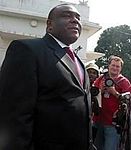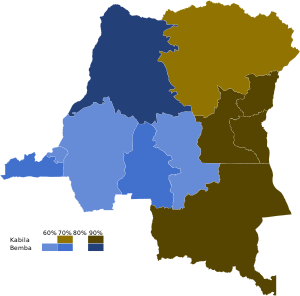|
| |||||||||||||||||
Presidential election | |||||||||||||||||
| |||||||||||||||||
| Turnout | 70.54% (first round) 65.36% (second round) | ||||||||||||||||
|---|---|---|---|---|---|---|---|---|---|---|---|---|---|---|---|---|---|
| |||||||||||||||||
| |||||||||||||||||
General elections were held in the Democratic Republic of the Congo on 30 July 2006. They were the first multiparty elections in the country in 41 years, and the first since the overthrow of longtime leader Mobutu Sese Seko nine years earlier. Voters went to the polls to elect both a new President of the Republic and a new National Assembly, the lower-house of the Parliament.
The polls were boycotted by the veteran opposition leader, Étienne Tshisekedi, who complained of fraud. The international community donated $460 million to fund the elections and deployed the world's largest UN peacekeeping operation, MONUC, to help the stability of the election. While the election was conducted relatively peacefully, the collection of the results proved chaotic, leading to armed clashes and growing fears of instability. As a result, DRC election officials announced that they would begin to release partial results earlier instead of only announcing the final count on 20 August.[1]
On 20 August, the CEI released its full provisional presidential election results, indicating that neither candidate was able to secure a majority, which led to a run-off election on 29 October. On that day, voters went to the polls to vote in:
- a run-off election for the Presidency, as no candidate had obtained more than 50 percent of the first-round vote.
- an election of provincial parliaments[2]
On 15 November, the CEI released its full provisional results for the presidential election's second round, indicating that Joseph Kabila had won. The results were, however, rejected by Bemba who claimed irregularities. On 27 November, the DRC Supreme Court confirmed that Kabila had won the election.
- ^ "Partial DRC election results to be released", Independent Online, 7 August 2006
- ^ (in French) "Publication du calendrier de la suite des opérations électorales"[permanent dead link], CEI, 31 July 2006



